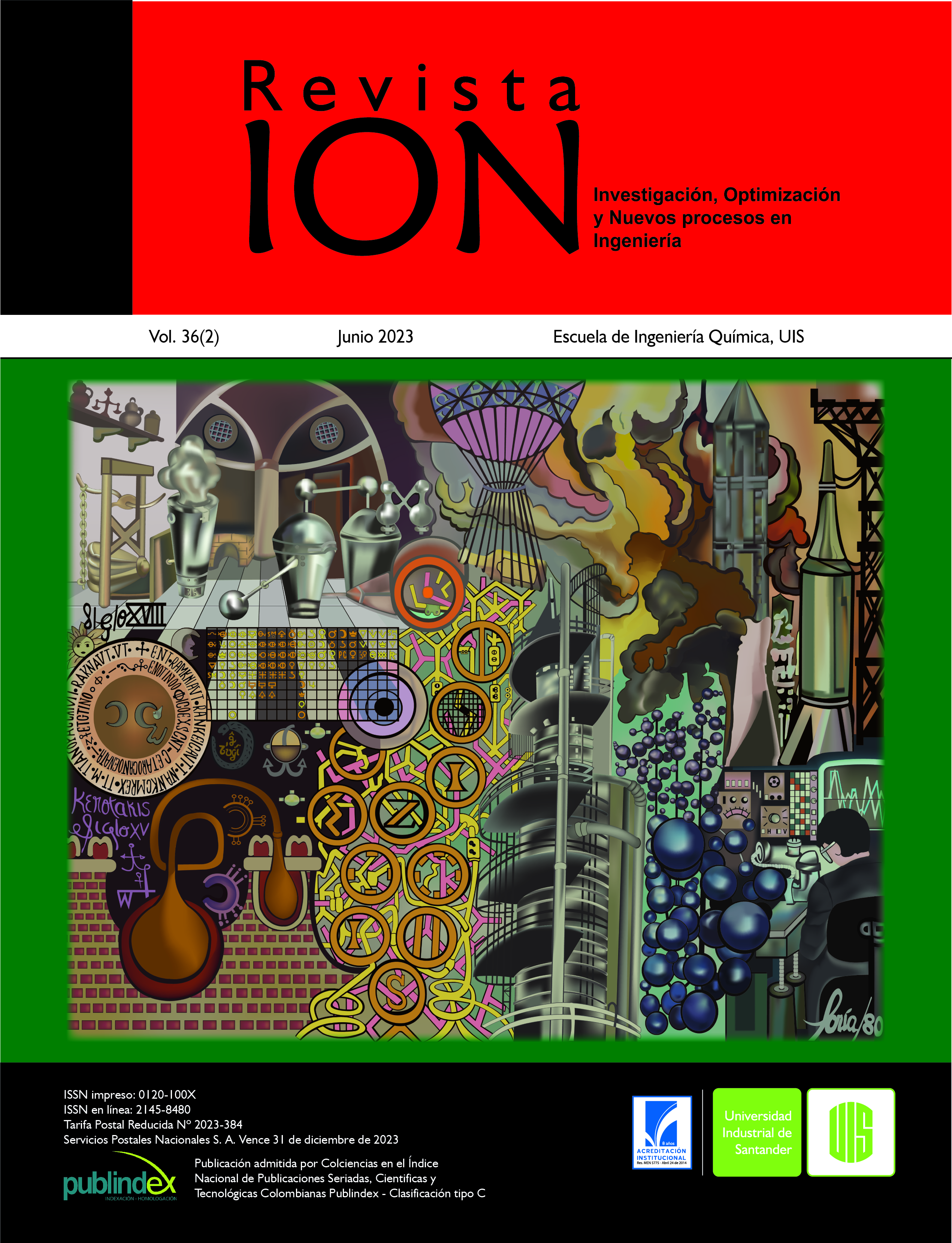Published 2023-06-30
Keywords
- Absorption,
- Ammonia,
- Murphree tray efficiency,
- Pressure drop,
- Sieve tray tower
How to Cite
Copyright (c) 2023 Amaury Pérez Sánchez, Maria Isabel La Rosa Veliz, Zamira María Sarduy Rodríguez, Eddy Javier Pérez Sánchez, Elizabeth Ranero Gonzalez

This work is licensed under a Creative Commons Attribution 4.0 International License.
Abstract
Tray towers are essentially vertical cylinders in which the liquid and gas are contacted in staged operation on plates, and are useful for distillation and absorption processes. In the present paper the design of a sieve tray tower was carried out for the physical absorption of ammonia using water as the solvent. The calculated values for the tower diameter, gas-pressure drop per tray, entrainment mass flowrate and entrainment-corrected Murphree tray efficiency were 0.962 m; 0.683 kPa/tray; 0.102 kg/s and 0.796 respectively. The calculated values for both the gas-pressure drop per tray and the entrainment mass flowrate are lower than the limits established by the process; therefore, the designed sieve tray tower can be successfully employed for the required mass transfer service.
Downloads
References
- Icarus. Towers, Columns. En: ICARUS Reference. USA: ICARUS Corporation; 1998. p. 8.3-18.
- Haan AB, Eral HB, Schuur B. Absorption and Stripping. En: Industrial Separation Processes-Fundamentals. 2nd ed. Germany: Walter de Gruyter GmbH; 2020. p. 57-79.
- Benitez J. Principles and modern applications of mass transfer operations. 2nd ed. USA: John Wiley & Sons; 2009.
- Treybal RE. Mass-transfer operations. 3rd ed. USA: McGraw-Hill; 1980.
- Dutta BK. Principles of Mass Transfer and Separation Processes. India: PHI Learning Private Limited; 2009.
- Theodore L, Ricci F. Mass Transfer Operations for the Practicing Engineer. USA: John Wiley & Sons; 2010.
- Sinnott R, Towler G. Chemical Engineering Design. 6th ed. United Kingdom: ButterworthHeinemann; 2020.
- Tang M, Zhang S, Wang D, Liu Y, Zhang Y, Wang H, Yang K. Hydrodynamics of the tridimensional rotational flow sieve tray in a countercurrent gas-liquid column. Chemical Engineering & Processing: Process Intensification. 2019;142:107568. doi.org/10.1016/j.cep.2019.107568
- Engel V. How to... Sieve Tray. Part 1. How to design and optimize Sieve Trays. Germany: WelChem Process Technology; 2020.
- Kister HZ. Distillation Design. USA: McGrawHill; 1992.
- Riese J, Grünewald M. Flexibility for Absorption and Distillation Columns. Chemical Engineering Transactions. 2018;68:787-92.
- Economopoulos AP. Computer design of sieve trays and tray columns. Chemical Engineering. 1978;85(27):109-20.
- Diao YF, Zheng XY, He BS, Chen CH, Xu XC. Experimental study on capturing CO2 greenhouse gas by ammonia scrubbing. Energy Conversion and Management. 2004;45:2283-96. doi.org/10.1016/j.enconman.2003.10.011
- Hüpen B, Kenig EY. Rigorous modelling of NOx absorption in tray and packed columns. Chemical Engineering Science. 2005;60:6462–71.
- Alrayah RAAA. Design and Cascade Control of a Sieve Tray Absorption Column (Master thesis). Wad Medani, Sudan: University of Gezira; 2013.
- Almoslh A, Alobaid F, Heinze C, Epple B. Experimental Study of the Influence of Gas Flow Rate on Hydrodynamic Characteristics of Sieve Trays and Their Effect on CO2 Absorption. Applied Sciences. 2021;11:8. doi.org/10.3390/app112210708
- Attarakih M, Abu-Khader M, Bart HJ. Dynamic analysis and control of sieve tray gas absorption column using MATLAB and SIMULINK. Applied Soft Computing. 2013;13:1152-69. doi.org/10.1016/j.asoc.2012.10.011
- Baniadam M, Fathikalajahi J, Rahimpour MR. Incorporation of Eulerian–Eulerian CFD framework in mathematical modeling of chemical absorption of acid gases into methyl diethanol amine on sieve trays. Chemical Engineering Journal. 2009;151:286-94. doi.org/10.1016/j.cej.2009.03.004
- Rafagnim NZ, Barbieri MR, Noriler D, Meier HF, Silva MKd. Euler–Euler model for CO2-MEA reactive absorptionon a sievetray. Chemical Engineering Research and Design. 2021;170:201-12. doi.org/10.1016/j.cherd.2021.03.033
- Vishwakarma V, Haq SA, Schleicher E, Schubert M, Hampela U. Experimental analysis of the hydrodynamic performance of an industrial-scale cross-flow sieve tray. Chemical Engineering Research and Design. 2021;174:294–306. doi.org/10.1016/j.cherd.2021.07.026
- Uys EC, Burger AJ, Preez LJD, Knoetze JH. The influence of gas physical properties onentrainment inside a sieve tray column. Chemical Engineering Research and Design. 2015;104:429-39. doi.org/10.1016/j.cherd.2015.08.031
- Pudjiastuti L, Widjaja T, Iskandar KK, Sahid F, Nurkhamidah S, Altway A, Putra AP. Modelling and simulation of multicomponent acetonebutanol-ethanol distillation process in a sieve tray column. Heliyon. 2021;7:e06641. doi.org/10.1016/j.heliyon.2021.e06641
- May MM, Gómez FI, Rodríguez MA. Rigorous modelling and simulation of the mass transfer on the trays of a pilot scale distillation column. 30th European Symposium on Computer Aided Process Engineering (ESCAPE30); 2020 may 24-27; Milano, Italy. p. 13-18.
- Gutiérrez EE, Salvagnini WM, Santos ME. Comparison between the design of experiments and simulation in the threephase distillation in a sieve tray column for glycerine dehydration. Chemical Engineering Research and Design. 2013;91:1186-1202. doi.org/10.1016/j.cherd.2013.01.011
- Mahdipoor HR, Shirvani M, Nasr MRJ, Shakiba S. Rigorous dynamic simulation of an industrial tray column, considered liquid flow regime and efficiency of trays. Trans IChemE, Part A, Chemical Engineering Research and Design. 2007;85(A8):1101-11. doi.org/10.1205/cherd05035
- Zavaleta-Aguilar EW, Simões-Moreira JR. Thermal design of a tray-type distillation column of an ammonia/water absorption refrigeration cycle. Applied Thermal Engineering. 2012;41:52-60. doi.org/10.1016/j.applthermaleng.2011.12.009
- Rodríguez MA, Gómez FI, Segovia JG, Uribe AR. Mechanical design and hydrodynamic analysis of sieve trays in a dividing wall column for a hydrocarbon mixture. Chemical Engineering and Processing: Process Intensification. 2015;97:55-65. doi.org/10.1016/j.applthermaleng.2011.12.009
- Nisola GM, Cho E, Orata JD, Redillas MCFR, Farnazo DMC, Tuuguu E, et al. NH3 gas absorption and bio-oxidation in a single bioscrubber system. Process Biochemistry. 2009;44(2):161-67. doi.org/10.1016/j.procbio.2008.10.004
- Renard JJ, Calidonna SE, Henley MV. Fate of ammonia in the atmosphere-a review for applicability to hazardous releases. Journal of Hazardous Materials. 2004;108(1-2):29-60. doi.org/10.1016/j.jhazmat.2004.01.015
- Piché S, Larachi F, Grandjean BPA. Improved liquid hold-up correlation for randomly packed towers. Trans IChemE Part A. 2001;79(1):71-80. doi.org/10.1205/026387601528543
- Sieres J, Fernández-Seara J, Uhía FJ. Experimental analysis of ammonia–water rectification in absorption systems with the 10 mm metal Pall ring packing. International Journal of Refrigeration. 2008;31(2):270-8. doi.org/10.1016/j.ijrefrig.2007.05.009
- Green DW, Southard MZ. Perry’s Chemical Engineers’ Handbook. 9th ed. USA: McGrawHill; 2019.
- Bennett DL, Watson DN, Wiescinski MA. New Correlation for Sieve-Tray Point Efficiency, Entrainment, and Section Efficiency. AIChE Journal. 1997;43(6):1611-26. doi.org/10.1002/aic.690430625
- Lockett MJ. Distillation Tray Fundamentals. USA: Cambridge University Press; 1986.


